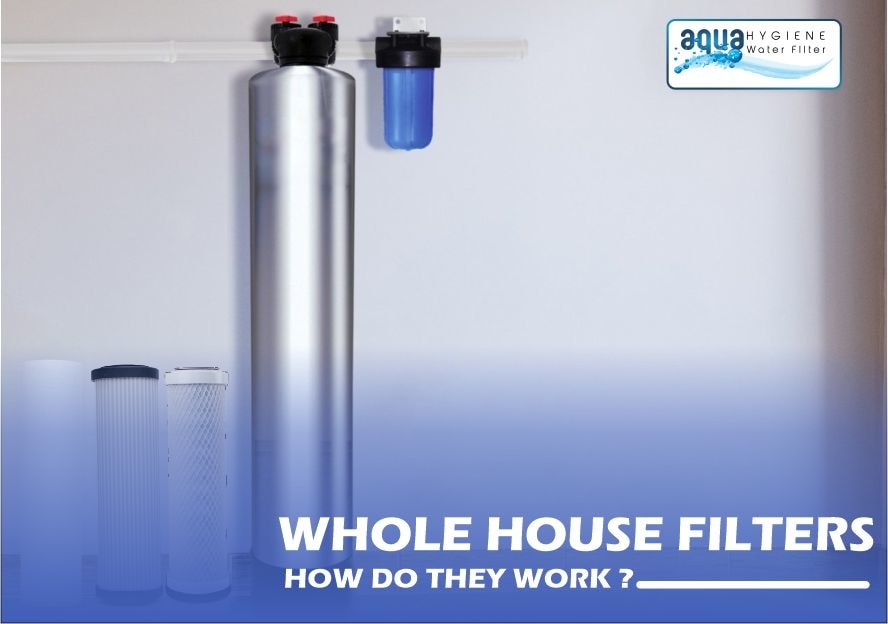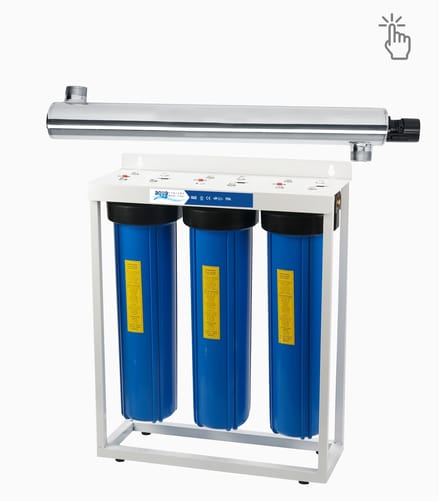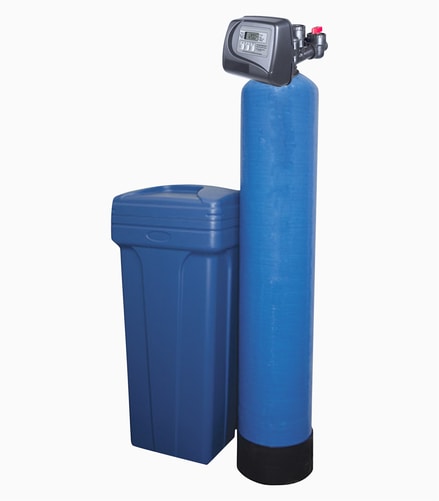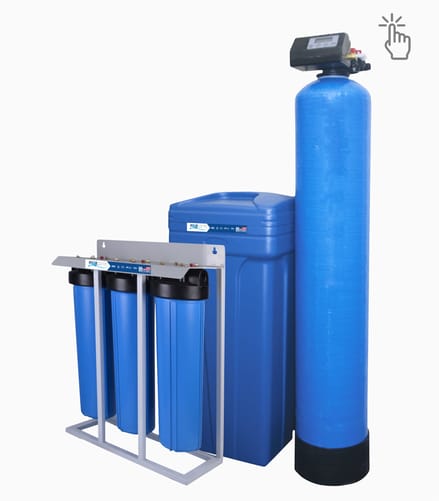What is a Whole House Water Filter and How Does It Work?

A whole house water filter treats water at its point it enters your home and supplies clean water everywhere you need it. Whole house filtration systems come in many different forms, including water softeners, UV water purifiers, or carbon filters. John Woodard, our Master Water Specialist, explains why whole house filtration is worth it and how to choose the best whole house water filter.
What is a whole house water filtration system?
A whole house filtration system could be a lot of things depending upon what you're filtering. If you're on a well supply, for example, the filtration system could be very elaborate. It could have a mechanical sediment filter, followed by a water softener, followed by an ultraviolet system. A whole house filtration system like this would soften, take out debris, and disinfect the water as it comes into the house. Whole-house filtration on a city water supply may just to get rid of sediment and chlorine or chloramine. But a whole house filter treats all the water entering the home so that all the water flowing into washing machines, dishwashers, coffee brewers, or shower heads is filtered.
What does a whole house water filtration system do?
The design of a particular whole house filter is made to filter out the contaminants you don't want in the household water supply. You may want to remove iron, hardness, or just chlorine. What whole house filtration system you need will be determined by what's in the water supply that needs filtering out. Your whole house water filter could include a water softener to remove iron, or it could be more elaborate and include a process called aeration or oxidation. The type of whole house filtration used is driven by what undesirable things are making water a problem for your home.
Are there different types of whole house water filtration systems?
Absolutely. The different types are determined by your water quality and the problems you're trying to eliminate with the whole house filtration system. If you're on city water, the variety of products is more limited. The main issue is to get rid of chlorine. That taste and odor that comes from the disinfectant that municipalities put in the water supply. It's good that they disinfect the water because it reduces deaths from typhoid, cholera, or diphtheria. But once chlorine gets to your home, it can be removed so that you can wash clothes and take showers without chlorinated water. And you certainly don't want to drink the chlorine.
For a well supply, there are a variety of whole house filtration options for different water problems, whether they involve chemicals, minerals, or gases like hydrogen sulfide that give a rotten egg smell. Getting rid of these contaminants may involve many steps and different technologies. The list of different whole house water filtration systems is long.
Aqua Hygiene Water softener Whole House System
Whole House Water Softener system
NO MORE HARD WATER. NO MORE PROBLEMS.
Aqua Hygiene water softener system is tested to prevent and remove the damage done by hard water. Extending the life of washing machines, water heaters, and other appliances. And getting cleaner and better-smelling laundry, soft water also keeps your skin and hair healthy

Learn more about the Aqua hygiene best whole house water filter and softener
What's the difference between a whole house water filter and an under-sink filter?
A whole house filter treats water at its point of entry (POE) into a household. It filters or treats the water that distributes throughout the house, including water for washing clothes, flushing toilets, taking showers, and brushing teeth. A drinking water system is point-of-use (POU) when it's under the counter or on the countertop. Countertop or under sink water filters are designed specifically for the water you drink, cook with, or run to an ice machine in the refrigerator. So the whole house is POE, for every drop of water throughout the house. Under-sink filters are POU, used for drinking, mixing beverages, and cooking.
What does a whole house system remove from water?
There are many different methods and steps to whole house filtration, but a whole house filter can be designed to remove any troublesome contaminants.
How do you install a whole house system?
In order to filter and treat all of the water going through the house, equipment needs to be installed on the earliest point possible, right where the water line from the city comes into the house. On well water supply, the filtration system goes right after the pressure tank, so it can catch every drop of water going into the house. On city water, a filter can reduce chlorine, sediment, or even ultraviolet disinfection. If a city's disinfection process fails or equipment doesn't work properly or a catastrophic event like a flood occurs, a UV system in your home will provide protection. On well water supply, ultraviolet disinfection typically works best as the last thing in the system that includes a variety of filters.
When should you use whole house filtration?
What is causing problems in your water? If your water has a lot of hardness, then you need a whole house water softener. If you have other minerals coming from your well, like iron or manganese, then you'll need a whole house process to remove them. On a city supply, removing chlorine is a good idea. If you're getting tired stains in the toilet or scraping the hardness residue off the showers, then you may want to consider a whole house water system.
What are the advantages of a whole house water filtration system?
The advantages are enormous. The problem could be as simple as getting rid of chlorine taste and odor from city water or heavy hardness from a well supply. A lot of hardness is miserable in the home. If your water is hard, you know it. You'll have the scale on the shower curtains, the scale on the showerhead, or discoloration in your dishwasher. A whole house water filtration system will reduce all of those problems. Many city water supplies have lots of mineral content depending upon the source, most commonly groundwater, so a whole house filter could be beneficial. The advantages are enormous if your water contains chemicals since chemicals are removed before people take showers or clothes are washed with it.
How do you know which filtration system whole house filtration system is best?
Again, that's going to be determined by what problems you're trying to correct. You certainly want to buy equipment that's reputable and designed to solve your problem, You also want to make sure it's not over the top and does things that you really don't need.
How much do whole house filtration systems cost and are they worth it?
If you're solving your water problems, then it's well worth the penny. Whole house filters can be as simple as a drop-in filter cartridge to solve sediment problems. This type of filter could hold a carbon block, for example, to remove chlorine. Carbon filters aren't nearly as expensive as backwashing or regenerating products like a water softener or a backwashing system for iron removal or odor removal. So, the cost of a whole house filtration system varies depending upon the type of equipment you need.




